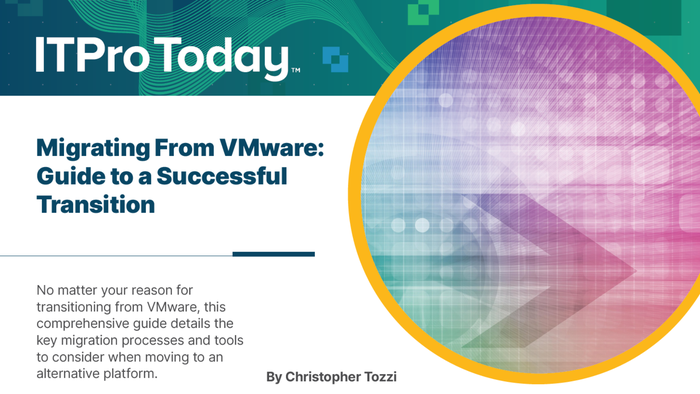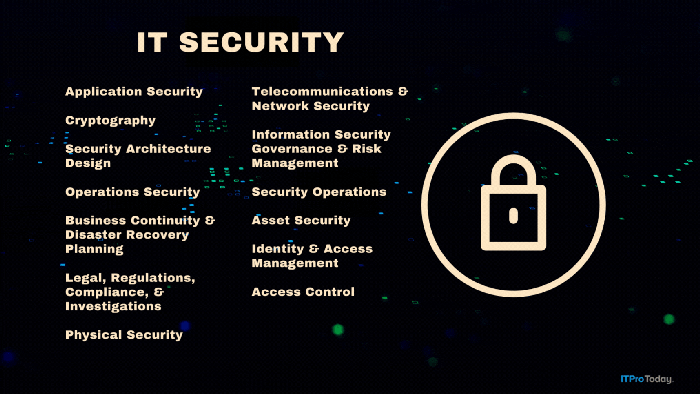The State of Corporate Email and the Cloud
I recently had the opportunity to have a chat with Michael Tweddle, senior director, product management, with Dell Software about the state of corporate email. Our discussion was centered on a recent survey, sponsored by Dell and released by Dimensional Research.
January 30, 2014

When one thinks about Dell, most times it's about the company's hardware business. But, Dell has made some significant investments in acquisitions over the past 5 years. Quest Software was acquired by Dell in September of 2012. The Quest acquisition brought a full portfolio of valuable software assets to Dell. With Dell becoming a private company, I expect to see more and more focus on the software business.
I recently had the opportunity to have a chat with Michael Tweddle, senior director, product management, with Dell Software about the state of corporate email. Our discussion was centered on a recent survey, sponsored by Dell and released by Dimensional Research. The survey results were gleaned from 202 IT Pros that work in companies with 1,000 employees or more.
Some of the survey results were unexpected, but the overall results show that email is still a highly critical part of the business. 71% surveyed described email as mission critical and 81% described email as the most important tool for employee communication. And, since it's still one of the most critical communication and collaboration vehicles in business, tampering with what works is slowing Cloud adoption. A whopping 86% stated that email is still being hosted on-premise, though 51% of those suggest that they are considering Cloud options.
Per the survey, the most important reason why Cloud email adoption is slow, is due to customers concerned about data loss, followed by loss of control, and then security. The majority of email users still utilize their company email as the primary resource for storing corporate data. In a world where Dropbox, SkyDrive (soon to be OneDrive), and others, are on display constantly in the media as popular Cloud storage services, apparently those services still sit far behind email for storage.
Microsoft Exchange, of course, leads the pack of on-premise offerings, with a clear 87% advantage over Lotus Notes, Novell GroupWise, and others. For business, those using a Cloud email service today, are led by another Microsoft offering, Office 365. Office 365 is followed directly by Google Apps, but Office 365's lead is a large one, garnering 76% of the Cloud email market for business. Interestingly enough, those that do use Office 365 for email, are Microsoft Exchange customers. Exchange adoption has clearly created a huge advantage for Microsoft. Google has never offered an on-premise solution, so moving to a Google Apps model is more of an unknown for businesses and more risky.
Michael was candid about the state of the Cloud, in general, and I found that he has a good read on business adoption of the Cloud. Michael is one of the more realistically thinking individuals I've talked to recently when it comes to Cloud adoption, understanding that businesses are more interested in building Private Clouds in 2014. But, Dell, through the Quest Software offerings, can provide value for customers who decide to dig their heels in on-premise, as well as, those who make the jump to the Public Cloud.
Obviously, with the survey being heavy on email Cloud adoption, and Office 365 being the break-away leader in Cloud email services, Dell is focusing their software efforts on helping companies migrate. Dell understands the issues and concerns companies have for migrating on-premise services, and offer a wide-range of solutions to ensure success, eliminate performance problems, and ease concerns about security and data loss.
Michael says,
"Email is still the lifeblood of communication within an organization, which means you simply can’t afford downtime or data loss during a migration. Our email migration solutions make the migration process simpler and safer, mitigating the risk of data loss and ensuring there is no impact on users during the migration."
There are other key pieces in the survey that should be of interest to anyone considering migrating on-premise email to the Cloud.
You can find the survey available for download here: The State of Corporate Email - Survey Results
Here's what Dell currently offers to help organizations with email migration and coexistence:
Dell Migration Manager for Exchange mitigates the risk of migrating, consolidating or restructuring an Exchange environment, ensuring zero impact on users while also requiring fewer resources. Migration Manager for Exchange enables direct migrations from legacy versions of Exchange to Exchange 2013 in one step and without interim environments or swing servers.
Dell OnDemand Migration for Email enables administrators to securely migrate users and data to Office 365, on-premises Exchange or hosted Exchange email platforms without installing or maintaining migration software
Dell Notes Migrator for Exchange provides fast, accurate migration, and mitigates the risk of data loss when transitioning from IBM Lotus Notes to Exchange or Office 365
Dell Coexistence Manager for Notes affords seamless collaboration between IBM Lotus Notes and Microsoft Exchange, maintaining business productivity throughout the coexistence period
Dell GroupWise Migrator for Exchange simplifies and accelerates the transition process and mitigates the risk of data loss when migrating from Novell GroupWise to Exchange or Office 365.
Dell Coexistence Manager for GroupWise provides interoperability between GroupWise and Exchange over the course of the migration.
The new Dell Migration Manager for PSTs quickly and reliably identifies, filters and migrates PST files to primary or archive mailboxes in Exchange 2010/2013 and Office 365.
Dell solutions for Microsoft Exchange help to properly prepare for an upcoming Exchange migration project, and manage the new environment once the migration is complete.
And, here's some valuable resources for connecting with Dell online:
Twitter: http://www.twitter.com/dellsoftware
Facebook: http://www.facebook.com/dellsoftware
Dell Software Exchange Solutions: http://software.dell.com/platforms/exchange
About the Author
You May Also Like







.png?width=700&auto=webp&quality=80&disable=upscale)